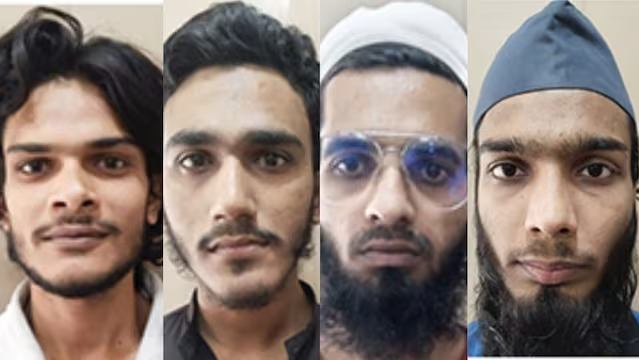

The Gujarat Anti-Terrorist Squad (ATS) has arrested four men believed to be part of a terror module linked to Al Qaeda in the Indian Subcontinent (AQIS). The arrests were the result of a coordinated operation spanning four cities across Gujarat, Delhi, and Uttar Pradesh. The group is accused of using social media to radicalize youth and incite violence against India.
The investigation began on June 10 after the ATS received information about five Instagram accounts allegedly spreading provocative and anti-national content. According to the ATS, these accounts were actively promoting videos from the banned terror group AQIS, encouraging followers to commit acts of religious violence and carry out terrorist attacks under the banner of "Ghazwa-e-Hind" (a prophesied battle for India). The content was designed to create discontent and promote armed rebellion against the government.
After identifying the individuals behind the social media handles, the Gujarat ATS formed four teams to conduct raids. Between July 21 and 22, with assistance from central agencies, the Delhi Police Special Cell, and the UP ATS, the teams apprehended the four suspects.
The arrested individuals were identified as:
During the arrests, investigators recovered incriminating evidence. From Fardeen Shaikh, they found AQIS literature promoting jihad against India in response to "Operation Sindoor," along with a sword. A video on his phone reportedly showed him waving the sword. The mobile phones of all four accused contained inflammatory videos and jihadi propaganda. The investigation also revealed that Mohd Faiq was collaborating with Pakistani Instagram accounts to spread the content.
The four have been charged under the Unlawful Activities (Prevention) Act (UAPA) and the Bharatiya Nyaya Sanhita. A local court has granted the ATS a 14-day remand for their interrogation.
To sum up, these arrests highlight the growing threat of online radicalization and the sophisticated, cross-border nature of modern terror networks. The investigation is ongoing, with the ATS now scrutinizing at least 25 other Instagram accounts connected to the module, signaling that the crackdown on this digital terror front is far from over.